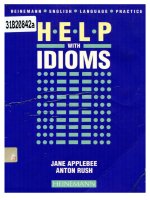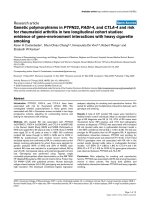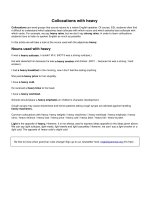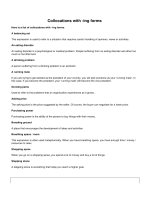Collocations with heavy
Bạn đang xem bản rút gọn của tài liệu. Xem và tải ngay bản đầy đủ của tài liệu tại đây (8.58 KB, 1 trang )
Collocations with heavy
Collocations are word groups that sound natural to a native English speaker. Of course, ESL students often find
it difficult to understand which adjectives best collocate with which nouns and which adverbs best collocate with
which verbs. For example, we say heavy rains, but we don’t say strong rains. In order to learn collocations
students have to listen to spoken English as much as possible.
In this article we will take a look at the nouns used with the adjectives heavy.
Nouns used with heavy
It was a heavy suitcase. I couldn’t lift it. (NOT It was a strong suitcase.)
His wife deserted him because he was a heavy smoker and drinker. (NOT …because he was a strong / hard
smoker.)
I had a heavy breakfast in the morning, now I don’t feel like eating anything.
She paid a heavy price for her stupidity.
I have a heavy cold.
He received a heavy blow to his head.
I have a heavy workload.
Schools should place a heavy emphasis on children’s character development.
Cough syrups may cause drowsiness and hence patients taking cough syrups are advised against handling
heavy machinery.
Common collocations with heavy: heavy weights / heavy machinery / heavy workload / heavy emphasis / heavy
rains / heavy reliance / heavy loss / heavy price / heavy cold / heavy blow / heavy fall / heavy burden.
Light is the opposite of heavy. However, it is not always used to express ideas opposite to the ideas given above.
We can say light suitcase, light meals, light weeks and light casualties. However, we can’t say a light smoker or a
light cold. The opposite of heavy cold is slight cold.
Stay on top of your writing! Download our grammar guide from www.englishgrammar.org to stay up-to-date.
Powered by TCPDF (www.tcpdf.org)









